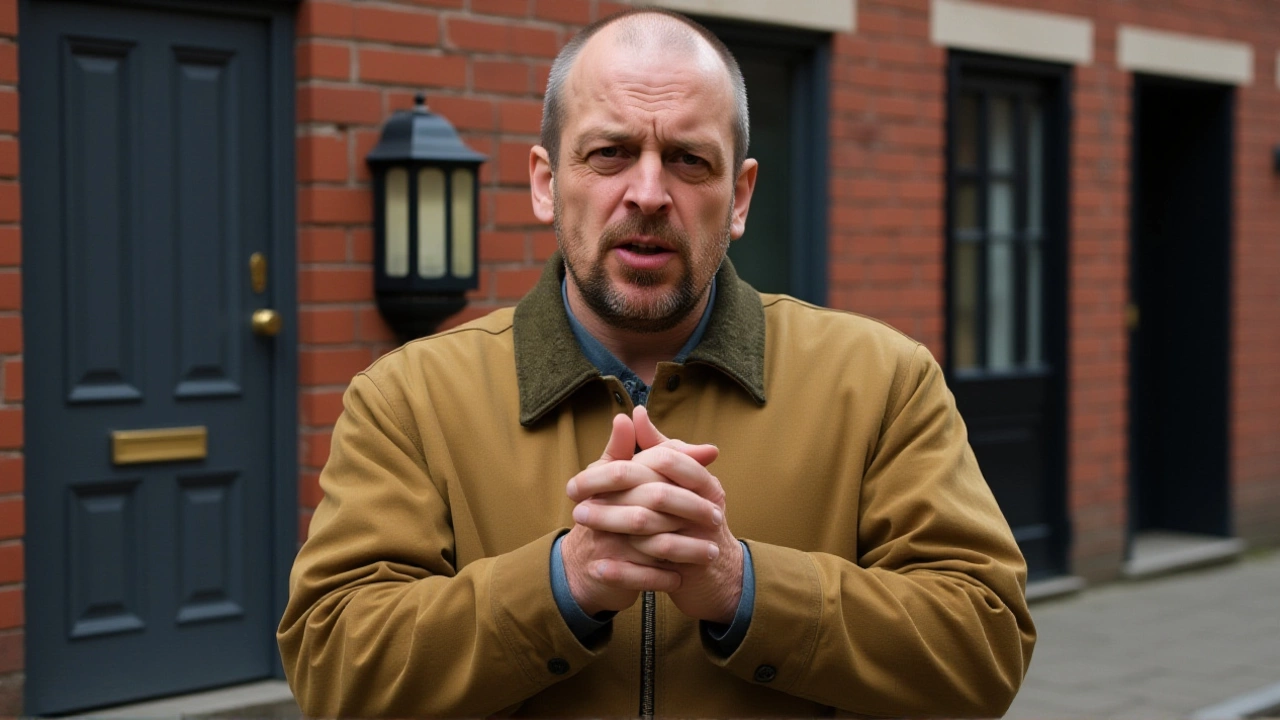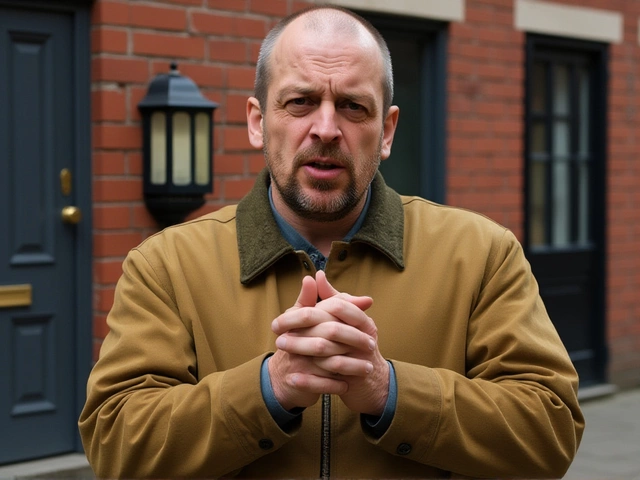On November 11, 2025, the BBC premiered Reunion, a four-part revenge thriller that doesn’t just grip viewers—it redefines what television can be. Starring deaf actor Matthew Gurney as Daniel Brennan, a man released after over a decade in prison, the series is built on silence, sign language, and the crushing weight of unspoken truths. Produced by Warp Films, the Sheffield-based studio behind Netflix’s Emmy-winning Adolescence, Reunion isn’t just another crime drama. It’s a seismic moment for representation, led by a predominantly deaf cast and crew, and written by deaf creator William Mager. The response? Overwhelming. Critics called it "devastating," "electrifying," and "a landmark in British television."
A Story Built on Silence
Daniel Brennan didn’t just lose his freedom—he lost his daughter. Carly Brennan (Lara Peake), the only person who ever truly understood him, vanished from his life the moment he was arrested. Now, out of prison and navigating a world that still treats him as an afterthought, he’s not looking for redemption. He’s hunting for answers. Who betrayed him? Why did no one speak up? And why does his estranged daughter refuse to meet him? The answers lie in the shadows of his past, and they’re tied to Anne-Marie Duff’s Christine, a woman whose grief has hardened into obsession. She believes Brennan destroyed her family. Her daughter, Miri (Rose Ayling-Ellis), is a quiet ghost of herself—terrified, confused, and caught between two broken worlds.The brilliance of Reunion lies in how it uses silence—not as an absence, but as a language. Scenes unfold without music, relying on the rhythm of sign language, the flicker of facial expressions, the weight of a paused breath. There’s no subtitle overload. No melodramatic swell. Just truth, raw and unfiltered. "No one to sign my name," one character says early on. It’s not just a line. It’s the show’s thesis.
From Near-Bankruptcy to Breakthrough
Just two years ago, Warp Films was on the brink. Co-founders Mark Herbert and Emily Feller admitted they were "so close to it being really tight and kind of a scary moment for Warp." Then came Adolescence. Premiering on Netflix in March 2025, the psychological thriller became the first streaming show ever to top the UK’s Barb Audiences weekly ratings. It swept the 77th Primetime Emmy Awards, winning Outstanding Limited Series, Best Director for Philip Barantini, and acting honors for Stephen Graham, Owen Cooper, and Erin Doherty. Suddenly, Warp wasn’t just surviving—they were leading."People identified with this very specific, authentic British story that resonated around the world," Herbert said. And that’s exactly what Reunion does—but this time, it’s not just British. It’s profoundly, unapologetically deaf.
A Once-in-a-Lifetime Opportunity
For Matthew Gurney, landing the role of Daniel Brennan wasn’t just a job. It was a revolution. "For me as a deaf actor, this was a kind of a once in a lifetime opportunity," he told reporters. "I don’t know when my next opportunity will be. It meant a lot to me, and it means a lot to our deaf acting community because we’re finally being seen. This should have happened ages ago. I don’t know why it’s happening in 2025… but I hope that directors, filmmakers, production companies see this program and realise that we can do it. Don’t be frightened. That’s my hope."His words echo through the industry. For decades, deaf characters were played by hearing actors, often with clumsy, inaccurate signing. Even when deaf actors were cast, roles were limited to sidekicks, victims, or comic relief. Reunion flips that. Every major role is played by a deaf performer. Sign language isn’t translated—it’s the primary dialogue. The camera lingers on hands, eyes, posture. The audience isn’t told what to feel; they’re invited to feel it.
"It’s rare to witness a narrative where the audience is taken on a journey with a very different set of senses," said Anne-Marie Duff. "We’re not just watching a crime story. We’re learning how to listen—not with our ears, but with our hearts. It’s about acknowledging each other’s truths, inside our families and beyond."

What Comes Next?
Reunion has already sparked conversations across schools, theaters, and policy circles. The BBC is in talks with the Department for Education about screening the series in secondary schools, mirroring the rollout of Adolescence, which is now being shown free to over 1,200 UK schools after securing support from Prime Minister Keir Starmer. Deaf advocacy groups are calling it "the most significant television moment for the community since The Silent Child in 2017."But Gurney remains cautious. "This isn’t a trend," he said. "It’s a test. If they make one more show like this, great. If they don’t? Then this was just a flash in the pan. We need more writers who are deaf. More directors who understand silence. More producers who aren’t afraid to invest in stories that don’t come with a ready-made formula."
Why This Matters
Reunion doesn’t just tell a story about trauma and justice. It challenges the very structure of storytelling. For too long, television has treated disability as a footnote. Here, it’s the foundation. The show’s success proves audiences don’t need to be spoon-fed accessibility—they crave authenticity. And when they get it, they stay.Warp Films’ journey—from near-collapse to global acclaim—mirrors the journey of the deaf community in media: ignored, underestimated, then suddenly, undeniably, unforgettable.
Frequently Asked Questions
Why is 'Reunion' considered a milestone for deaf representation?
Unlike past productions that cast hearing actors to play deaf roles, 'Reunion' features a predominantly deaf cast, including lead actor Matthew Gurney and Rose Ayling-Ellis, with sign language as the primary mode of communication. The show was written by deaf creator William Mager and developed with extensive input from the deaf community, ensuring cultural and linguistic accuracy. This level of authentic representation has never been seen before in a mainstream British thriller.
How did Warp Films recover from near-bankruptcy?
Warp Films was on the verge of collapse in 2023 before the global success of 'Adolescence,' which premiered on Netflix in March 2025. The series became the first streaming show to top the UK’s Barb Audiences ratings and won multiple Emmy Awards, including Outstanding Limited Series. This breakthrough brought international funding and credibility, allowing Warp to greenlight 'Reunion' without compromising its creative vision.
What makes 'Reunion' different from other crime dramas?
'Reunion' eliminates traditional scoring and relies on visual storytelling, sign language, and silence to build tension. The narrative is driven by emotional subtext rather than exposition. It’s less about who did what, and more about how trauma echoes across generations—especially when communication is fractured. Critics have called it a 'pseudo-Western revenge thriller' with the emotional depth of a family saga.
Is 'Reunion' available with subtitles or audio description?
Yes. The BBC provides full British Sign Language (BSL) interpretation, English subtitles, and audio description for visually impaired viewers. But crucially, the show doesn’t treat subtitles as a necessity—it integrates them artistically into the frame, often using them as part of the visual composition. This approach respects deaf viewers as the primary audience, not an afterthought.
Will there be a second season of 'Reunion'?
The BBC has not officially confirmed a second season, but internal sources say discussions are underway. With over 6.2 million viewers across BBC One and iPlayer in the first week, and international interest from HBO Max and CBC, a renewal is highly likely. However, creator William Mager has emphasized that any continuation would need to remain true to the community’s voice—not just follow a formula.
How has the deaf community responded to 'Reunion'?
The response has been overwhelmingly emotional. Deaf organizations like the National Deaf Children’s Society and the British Deaf Association have praised the show for its dignity and depth. Social media has been flooded with personal stories from deaf viewers who said, for the first time, they saw themselves on screen—not as a stereotype, but as a complex human being with rage, love, and grief. One tweet summed it up: 'I didn’t know I was waiting for this until I watched it.'

